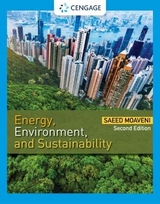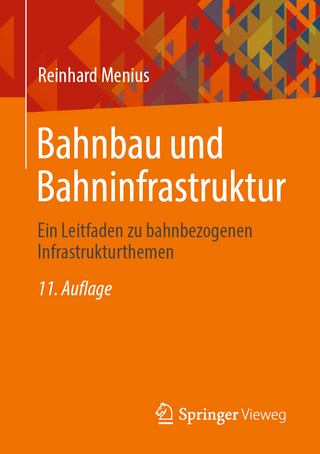
Energy, Environment, and Sustainability
CL Engineering (Verlag)
978-1-133-10509-1 (ISBN)
- Titel erscheint in neuer Auflage
- Artikel merken
Each chapter begins with clear learning objectives and concludes with a helpful summary. Relevant, everyday examples clarify concepts. Hands-on end-of-chapter problems require students to gather and analyze information as well as prepare brief reports and presentations. Students strengthen written and oral communication skills as well as their abilities to work in teams as many problems require group work and some even require whole-class participation.
Dr. Saeed Moaveni is a successful engineer, author and educator. He is a licensed professional engineer in the State of New York and has more than 35 years of experience in practice, teaching and research. Dr. Moaveni has held faculty appointments at several universities, including University of South Carolina, Syracuse University and Minnesota State University, and he has served as a graduate program coordinator, department chair and dean. He is the former dean of the David Crawford School of Engineering at Norwich University -- one of the oldest engineering schools in the country (founded in 1819). He has served as a consultant to various companies and universities, and as a reviewer and panelist for the National Science Foundation for more than 25 years. As a well-known educator and researcher, Dr. Moaveni has received numerous awards throughout his career, including the Jack Cermak Distinguished Professor Fellowship, the American Society for Engineering Education Outstanding Young Faculty Award, the Inter Faculty Organization (IFO) Award for Outstanding Contributions to Women's Advancement in Minnesota State Universities, the International Network for Engineering Education and Research Recognition Award and the Global Citizen Award from Minnesota State University. Dr. Moaveni's various textbooks have been translated into many languages, including traditional Chinese, simplified Chinese, Portuguese, Farsi and Korean. He has been invited abroad as a visiting scholar at numerous universities, including Kyushu University (Japan), National Chiao Tung University (Taiwan), National Cheng Kung University (Taiwan), the Institute of Theoretical and Applied Mechanics at National Taiwan University, Shanghai University of Engineering Science and Kwame Nkrumah University of Science and Technology (Ghana).
Part I: BASIC CONCEPTS.
1. Introduction.
Basic Human Needs. Energy. Environment. Sustainability. Summary. Problems.
2. Fundamental Dimensions and Systems of Units.
Fundamental Dimensions and Units. System of Units. Dimensional Homogeneity and Unit Conversion. Components and Systems. Summary. Problems.
Part II: ENERGY.
3. Energy & Power.
Work and Energy. Forms of Energy. Difference between Energy and Power. Energy Contents (Heating Values) of Fuels. Summary. Problems.
4. Electricity.
Current, Voltage, Electric Power – Basic Concepts. Residential Power Distribution and Consumption. Lighting Systems. Electric Power Production. Summary. Problems.
5. Thermal Energy: Heat Loss and Gain in Buildings.
Temperature Difference and Heat Transfer – Basic Concepts. Modes of Heat Transfer. Daylighting. Degree-Days and Energy Estimation. Summary. Problems.
6. Energy Consumption Rates and Nonrenewable Energy Sources.
World Energy Consumption Rates. U.S. Energy Consumption Rates. Fossil Fuels. Summary. Problem.
7. Renewable Energy.
Solar Energy and Solar Systems. Wind Energy. Hydro-Energy. Biomass. Summary. Problems.
Part III: ENVIRONMENT.
8. Air and Air Quality Standards.
Atmosphere, Weather, and Climate. Outdoor Air Quality Standards. Indoor Air Quality Standards. Global Air Quality Issues. Summary. Problems.
9. Water Sources, Consumption Rates, and Quality Standards.
Water - Basic Concepts. Personal Water Consumption. Water Consumption in Agriculture, Commercial and Industrial Sectors. Drinking Water Standards in the United States. Global Water Quality Issues. Summary. Problems.
10. Understanding Common Materials that We Use Everyday.
Earth our Home. The Phases of Matter and Properties of Materials. Metals. Plastics, Glass, Composites, and Wood. Concrete. Summary. Problems.
11. Municipal and Industrial Waste and Recycling.
Municipal Waste. Industrial Waste. Recycling and Composting. Summary. Problems.
Part IV: SUSTAINABILITY.
12. Sustainability.
The Earth Chapter. Sustainability Concepts. Sustainability Methods. Apply What You Have Learned – Knowledge is Power. Summary. Problems.
| Erscheinungsdatum | 13.07.2017 |
|---|---|
| Sprache | englisch |
| Maße | 201 x 21 mm |
| Gewicht | 590 g |
| Themenwelt | Technik ► Bauwesen |
| Technik ► Maschinenbau | |
| ISBN-10 | 1-133-10509-2 / 1133105092 |
| ISBN-13 | 978-1-133-10509-1 / 9781133105091 |
| Zustand | Neuware |
| Informationen gemäß Produktsicherheitsverordnung (GPSR) | |
| Haben Sie eine Frage zum Produkt? |
aus dem Bereich



